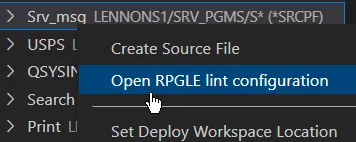Linter
The information below is specific to the linter in the RPGLE extension.
Opening the linter config
Use vscode-rpgle.openLintConfig to open the rules configuration for the source you’re working in.

Or you can right click on a library filter:

If a linter rules file does not exist, you will be asked asked if you want to create one. The created file will provide some default rules, as below.
Relative lint config
- If you are developing in source members (
LIB/QRPGLESRC/MYSOURCE.RPGLE)- the the linter config exists in
LIB/VSCODE/RPGLINT.JSON. - Each library has its own rules configuration file, binding it to all RPGLE sources in that library.
- config changes get pickup when RPGLE sources are re-opened.
- the the linter config exists in
- When developing in the IFS:
- linter rules config exist in
.vscode/rpglint.jsonrelative to the current working directory. - config changes get pickup when RPGLE sources are re-opened.
- linter rules config exist in
- When developing in a local workspace
- linter rules exist in
.vscode/rpglint.jsonrelative to the workspace. - Local RPGLE gets scanned automatically when config is changed
- linter rules exist in
Lint options
Below are some available lint configs. See the rpglint.json schema for the most up to date rules .
| Type | Rule | Value | Description |
|---|---|---|---|
| 🌟 | indent | number | Indent for RPGLE. |
| 🌟 | BlankStructNamesCheck | boolean | Struct names cannot be blank (*N). |
| 🌟 | QualifiedCheck | boolean | Struct names must be qualified (QUALIFIED). |
| 🌟 | PrototypeCheck | boolean | Prototypes can only be defined with either EXT, EXTPGM or EXTPROC |
| 🌟 | ForceOptionalParens | boolean | Expressions must be surrounded by brackets. |
| 🌟 | NoOCCURS | boolean | OCCURS is not allowed. |
| 🤔 | NoSELECTAll | boolean | ’SELECT *’ is not allowed in Embedded SQL. |
| 🌟 | UselessOperationCheck | boolean | Redundant operation codes (EVAL, CALLP) not allowed. |
| 🌟 | UppercaseConstants | boolean | Constants must be in uppercase. |
| 🌟 | IncorrectVariableCase | boolean | Variable names must match the case of the definition. |
| 🌟 | RequiresParameter | boolean | Parentheses must be used on a procedure call, even if it has no parameters. |
| 🌟 | RequiresProcedureDescription | boolean | Procedure titles and descriptions must be provided. |
| 🌟 | StringLiteralDupe | boolean | Duplicate string literals are not allowed. |
| 🌟 | RequireBlankSpecial | boolean | *BLANK must be used over empty string literals. |
| 🌟 | CopybookDirective | string | Force which directive which must be used to include other source. (COPY or INCLUDE) |
| 🌟 | DirectiveCase | string | Directives must be in the specified case. (lower or upper) |
| 🌟 | UppercaseDirectives | boolean | Deprecated use DirectiveCase instead. Directives must be in uppercase. |
| 🤔 | NoSQLJoins | boolean | JOINs in Embedded SQL are not allowed. |
| 🌟 | NoGlobalsInProcedures | boolean | Globals are not allowed in procedures. |
| 🌟 | SpecificCasing | array | Specific casing for op codes, declartions or built-in functions codes. |
| 🌟 | NoCTDATA | boolean | CTDATA is not allowed. |
| 🌟 | PrettyComments | boolean | Comments cannot be blank, must start with a space and have correct indentation. |
| 🌟 | NoGlobalSubroutines | boolean | Global subroutines are not allowed. |
| 🌟 | NoLocalSubroutines | boolean | Subroutines in procedures are not allowed. |
| 🌟 | NoUnreferenced | boolean | Unreferenced definitions are not allowed. |
| 🔒 | NoExternalTo | string array | Calls to certain APIs are not allowed. (EXTPROC / EXTPGM) |
| 🔒 | NoExecuteImmediate | boolean | Embedded SQL statement with EXECUTE IMMEDIATE not allowed. |
| 🔒 | NoExtProgramVariable | boolean | Declaring a prototype with EXTPGM and EXTPROC using a procedure is now allowed. |
| 🤔🌟 | IncludeMustBeRelative | boolean | When using copy or include statements, path must be relative to the root. Usage is only recommended for local/workspace projects. |
| 🤔 | SQLHostVarCheck | boolean | Warns when referencing variables in Embedded SQL that are also defined locally. |
| 🤔 | RequireOtherBlock | boolean | Requires SELECT blocks to have an OTHER block. |
Type key
| Key | Value |
|---|---|
| 🌟 | Clean code |
| 🤔 | Safe code |
| 🔒 | Secure code |
SpecificCasing example
This rule allows you to specify the casing required for any or all declares or BIFs.
If you want all DCL to be lower case and all BIFs to be upper case, then it would be coded like this:
"SpecificCasing":[ {"operation": "*BIF","expected": "*upper"}, {"operation": "*DECLARE", "expected": "*lower"} ]If you wanted %parms and %timestamp to always be lower case, and all other BIFs to be upper case, then it would be coded like this:
"SpecificCasing": [ { "operation": "%parms", "expected": "*lower" }, { "operation": "%timestamp", "expected": "*lower" }, { "operation": "*bif", "expected": "*upper" } ]Or, if for some reason, you wanted %timestamp to always be coded as %TimeStamp then it could be coded like this:
"SpecificCasing": [ { "operation": "%parms", "expected": "*lower" }, { "operation": "%timestamp", "expected": "%TimeStamp" }, { "operation": "*bif", "expected": "*upper" } ]